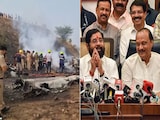The Supreme Court said on Tuesday that driving under the influence of alcohol a truck carrying the Provincial Armed Constabulary (PAC) personnel is a very serious misconduct and such indiscipline cannot be tolerated and that too in the disciplined Military.
A bench comprising Justices MR Shah and BV Nagarathna said merely because there was no major loss and it was a minor accident cannot be a ground to show leniency.
"It was sheer good luck that the accident was not a fatal accident. It could have been a fatal accident. When the employee was driving a truck carrying the PAC personnel, the lives of those PAC personnel who were travelling in the truck were in the hands of the driver. Therefore, it can be said that he played with the lives of those PAC personnel, who were on duty and travelling from Fatehpur to Allahabad on Kumbh Mela duty," the bench said.
The Supreme Court was hearing an appeal filed by a PAC driver (since deceased) challenging the order of dismissal passed by the Disciplinary Authority which had held him guilty for causing an accident under the influence of alcohol.
The top court further said that even otherwise, driving a vehicle under the influence of alcohol is not only a misconduct but also an offence.
"Nobody can be permitted to drive the vehicle under the influence of alcohol. Such a misconduct of driving a vehicle under the influence of alcohol and playing with the life of others is a very serious misconduct. There are also other misconducts earlier committed by the employee," the bench said.
It said considering the statement of the employee that he had consumed the liquor after the accident with the objective to suppress the fear, the punishment of dismissal can be said to be too harsh and may be treated one for compulsory retirement.
"In view of the above and for the reasons stated hereinabove and in the peculiar facts and circumstances of the case, the award of punishment of dismissal can be said to be too harsh, the punishment of dismissal is directed to be converted into compulsory retirement of the employee."
"As the employee has since died, and on converting the punishment of dismissal to that of compulsory retirement, death-cum-retirement benefits as also the benefit of family pension, if any, shall be paid to the legal heirs of the deceased employee in accordance with law and bearing in mind that punishment of dismissal has now been converted into one of compulsory retirement. The present appeal is partly allowed to the aforesaid extent," the bench said.
(Except for the headline, this story has not been edited by NDTV staff and is published from a syndicated feed.)















